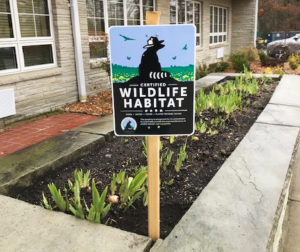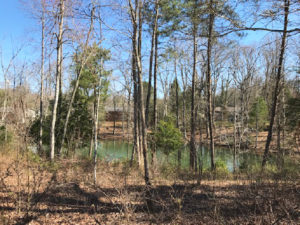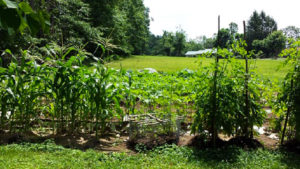Uplands Village a Community ‘Gone Wild’ in Caring for Environment

Uplands Village is a National Wildlife Federation-certified Wildlife Habitat.
On the Cumberland Plateau in the eastern Tennessee town of Pleasant Hill, the strong-willed residents of the United Church of Christ’s Uplands Village have a long tradition of social justice activism. But theirs is not an abstract participation: close to home, Uplanders are passionate about saving the environment for the benefit of all God’s creatures.
So when Louise Mallory-Elliott — an Uplands resident and member of its Environmental and Sustainability Committee — read about the National Wildlife Federation’s Certification of Wildlife Habitat program on earth911.com, she knew it was a perfect match for the Uplands grounds.
Mallory-Elliott “was keenly aware that all the conditions [for certification] had long been met as an expression of the core values on the Uplands campus, combined with its unique acreage and lakes,” says Herschel Murner, executive director. “Nature had largely been left undisturbed, water purity had already been addressed, toxic chemicals were discouraged beginning in 2016, and native plants had always been valued.”
Uplands Village — part of the United Church Homes family of communities — includes a wellness center for rehabilitation and memory care, a long-term care home, an assisted living center, plus 166 independent living homes, duplexes and apartments. But almost 65 percent of its 500-acre grounds are devoted to the preservation of wildlife, says Mallory-Elliott.
Together, “volunteers and management maintain 16 acres of wetlands to reduce storm flooding, filter water, prevent soil erosion, and create habitat,” Mallory-Elliott says.

Uplands leaves wetlands and other natural areas alone, tending to them as necessary to assure that plant and animal diversity thrives.
The work includes monitoring fish-stocked lakes for water vitality and leaving tree limbs in lakes to serve as shelter and spawning sites for fish, and food for beavers. So that the beavers don’t become a nuisance, Uplands plants food source bushes for them. The wildlife habitat at Uplands also includes a gaggle of geese, ducks, deer, groundhogs, squirrels, turkeys, raccoons, bats, and their friends, says Mallory-Elliott. She recounts one Uplands resident saying, “Living at Uplands is like living in a park.”
But focusing on Love of Creation isn’t something Uplands residents started when the UCC kicked off its 3 Great Loves emphasis. Its eco-justice efforts go back to the 1980s, when a resident-initiated recycling program began. That program “grew to become the Cumberland County (Tenn.) Recycling Program as well as a curbside recycle program in Pleasant Hill,” says Murner. “The Pleasant Hill program serves as a model for rural communities throughout Tennessee.”
Today, the residents’ recycling efforts have led to a corporate program of recycling throughout all of the buildings on campus. A volunteer Litter Patrol picks up cigarette butts, plastic and other items known to be toxic for the environment, and all Members Assemblies and corporate events are plastic-free zones.
“Reducing plastics is about saving our air, waters, and land in order to support the life of all God’s creatures,” Murner adds. “All these environmental initiatives are eco-justice projects, as we know that the poor and disadvantaged communities suffer inordinately [the consequences of] anti-environmental practices. We are blessed with 500 acres on the Cumberland Plateau and we are called to be good stewards of this land.”

Uplands’ Environmental and Sustainability Committee distributed guidelines in 2016 for green alternatives to toxic lawn and garden products.
Uplands’ eco-conscious efforts were formalized in 2015, when residents formed the Environmental and Sustainability Committee to coordinate campus-wide volunteer efforts and disseminate information. “One of the committee’s first acts was to work with management to remove toxic chemicals from public buildings and encourage green alternatives for independent living residents’ lawn care needs,” Mallory-Elliott says. “Hazardous waste collection was established as an annual event in 2016.”
Additionally, the Uplands’ healthy waters program, established in 2016, has had a profound impact on the local community. The ponds, creeks, and wetlands are a watershed that serves the many communities below Uplands’ location on the Cumberland Plateau.
“If you think about it, our first calling as people of faith in the book of Genesis is to be caretakers of creation,” says the Rev. Brooks Berndt, the UCC’s minister of environmental justice. “We need more and more communities like Uplands to live out this calling in such exemplary ways.”
Uplands’ eco-justice efforts are still expanding. Currently, the community is working with the Volunteer Energy Cooperative, the Tennessee Valley Authority, and private investors to secure its first 1-megawatt solar array.
How did Uplands’ community spirit of environmental justice happen? “As a grassroots movement,” says Mallory-Elliott of the Environmental and Sustainability Committee’s work. “The beauty of the natural environment, combined with the UCC core value of love-for-creation-necessitating-human-responsibility, caused one caring heart to inspire the next.”
Murner calls Uplands’ accomplishments “a paradigm shift.”
“Uplands is not rich or heavily endowed,” he says, “but it now recognizes that its mission’s sustainability is integrally tied to its stewardship of its environment. The future is just beginning.”
Join Our Mailing LIst
"*" indicates required fields
Follow on Facebook
IFM Community Medicine's Campbell Receives Missouri Physicians' Distinguished Service Award - CHHSM
www.chhsm.org
The Missouri Academy of Family Physicians (MAFP) presented David Campbell, M.D., FAAFP, and president and CEO of IFM Community Medicine in St. Louis, with the 2024 Distinguished Service Award during t...